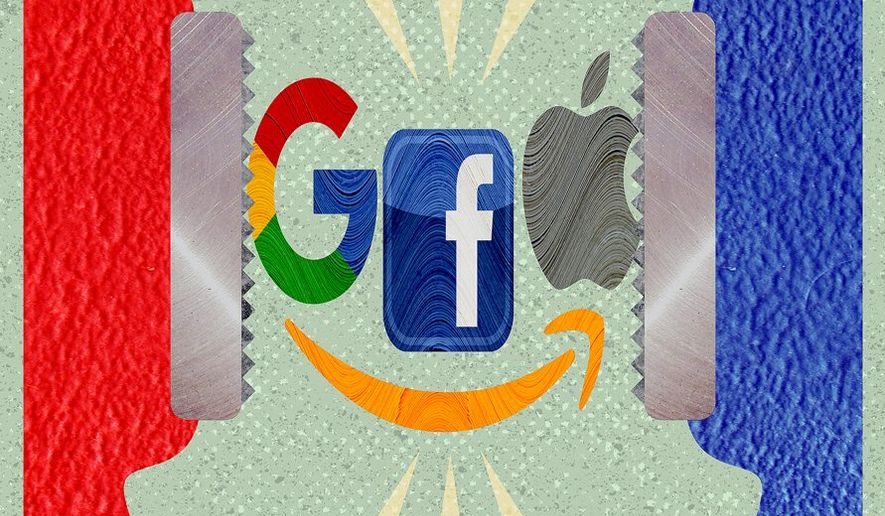OPINION:
Last week, a hearing for the history books was held on Capitol Hill. The CEOs of tech giants Amazon, Apple, Facebook and Google all appeared before the House Judiciary Committee Subcommittee on Antitrust, Commercial, and Administrative Law via videoconference — the first time the four testified before Congress at the same time.
While the hearing was ostensibly about anticompetitive behavior, Republican members of the subcommittee seemed largely focused on censorship of conservatives online. Meanwhile, Democratic members seemed to be advocating for a new standard of antitrust action to replace consumer welfare, undermining a half-century’s worth of legally accepted business practices. Both parties should tread lightly in potential next steps; the strength of the American economy is at stake.
First, it’s entirely predictable that congressional Republicans took the prime opportunity to scold four top tech CEOs at once about censorship, scoring populist points for their political base. But, they should be careful what they wish for. Any extended power the Trump administration uses to police tech companies’ moderation policies online could just as easily be used by future Democratic administrations for progressive aims.
One specific incident from the hearing laid this potential problem bare. Rep. Greg Steube, Florida Republican, criticized Google CEO Sundar Pichai for YouTube taking down a video of doctors promoting hydroxychloroquine as a treatment to COVID-19. Later in the hearing, Rep. David Cicilline, Rhode Island Democrat, criticized Facebook CEO Mark Zuckerberg for not taking the same video down fast enough.
The lesson from this exchange is clear: It is impossible for Big Tech companies to please politicians because they are being given completely contradictory advice on moderation. Democrats want the companies to be more aggressive in taking down posts, while Republicans want them to be less aggressive. This is precisely why content moderation should be left in the hands of the companies as private businesses instead of given over to the political sway of Washington that may change from year to year.
Second, Democrats were more on topic with antitrust than their Republican colleagues, but they often overstated the power that these companies have and seemed to yearn for a different standard of antitrust than the consumer welfare standard that has been widely accepted since the 1980s.
Rep. Cicilline was perhaps the worst offender on the former point. As the Competitive Enterprise Institute’s Ryan Young points out, the congressman claimed that “Amazon controls 70 percent of ‘online marketplaces,’” when in fact that is, “equivalent to about 4 or 5 percent of retail sales.” The congressman also made some questionable claims about Google’s market share, conflating its search engine with all searches on the internet. While the Big Four tech giants are undoubtedly dominant in their respective fields, they still face fierce competition from myriad companies vying for users’ attention and money.
At one point, the subcommittee recessed because of technical problems with the videoconferencing software they were using from Cisco — ironically underlining a point about competition. Apple and Facebook also offer video calling, but neither are dominant. Zoom, a company most Americans hadn’t heard of until recently, is quickly becoming the web meeting platform of choice — and it was founded less than 10 years ago.
No matter how old or dominant any single tech company may seem at a point in time, it’s naive to assume that they will remain the top dog forever. In the 1990s, for example, the federal government sued Microsoft over fears Internet Explorer would hold a monopoly on web browsers — a laughable prospect today. From 2005 to 2008, Myspace was the largest social media site in the world, pulling in hundreds of millions of dollars a year … then was quickly squashed by a dorm-room startup called “The Facebook.”
While the government still has a role to play in policing anticompetitive behavior that harms users’ wallets, Facebook and Google offer all of their basic services for free, while Amazon and Apple products are quite competitively priced and reap billions in profit as a result.
Yet, underlying many of the questions congressional Democrats asked in the hearing seemed to be a yearning to shift a long-standing precedent. From the 1980s onward, the government has engaged in antitrust action with the justification of maximizing consumer welfare. Democrats want a new standard more concerned about inequality — what lawyer Konstantin Medvedovsky famously coined as “hipster antitrust.”
This antitrust change would create legal uncertainty for business, politicize investigations, and ultimately harm the economy and delay the economic recovery from COVID-19. Instead of adopting radical proposals, Congress should let current agency investigations play out and embrace a positive antitrust agenda including ideas with broad bipartisan support. Shifting jurisprudence to the populist (and often contradictory) whims of politics would undermine the American economy at a moment when it needs strengthening.
• Casey Given is the executive director of Young Voices.




Please read our comment policy before commenting.